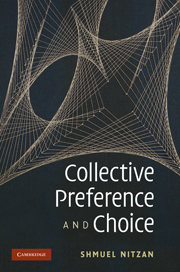Book contents
- Frontmatter
- Contents
- List of figures
- Preface
- Acknowledgments
- Part I Introduction
- 1 The reason for the problems
- 2 Brief overview of the problems
- 3 The relationship between preferences and choice
- Part II Different Preferences
- Part III Identical Preferences, Different Decisional Skills
- Bibliography
- Author index
- Subject index
1 - The reason for the problems
Published online by Cambridge University Press: 05 June 2012
- Frontmatter
- Contents
- List of figures
- Preface
- Acknowledgments
- Part I Introduction
- 1 The reason for the problems
- 2 Brief overview of the problems
- 3 The relationship between preferences and choice
- Part II Different Preferences
- Part III Identical Preferences, Different Decisional Skills
- Bibliography
- Author index
- Subject index
Summary
The term preferences or system of preferences relates to tastes defined on a set of alternatives. The term choice refers to a pattern of behavior that takes the form of choice from a set of alternatives. In the context of collective choice, that is, choice by a number of individuals, the alternatives can be possible decisions of a group of judges or of a jury, the possible modes of action faced by a board of directors, different policies considered by a government, local community, committee of experts, a political party that wishes to win an election, or a group of civil servants. The use of the terms social preferences or social choice is common in social contexts in which the chosen alternatives affect several individuals (some or all members of society). These terms play an important role in areas of economics and political science that are concerned with decisions that affect different individuals. Not only are these individuals affected by the social decision, they or their representatives are often directly involved in making the decision. In economics, for example, decisions on family consumption are made by family members, decisions on the business strategy of a company are made by members of the board of directors and decisions on government policy are reached by members of a committee of experts.
- Type
- Chapter
- Information
- Collective Preference and Choice , pp. 3 - 8Publisher: Cambridge University PressPrint publication year: 2009



